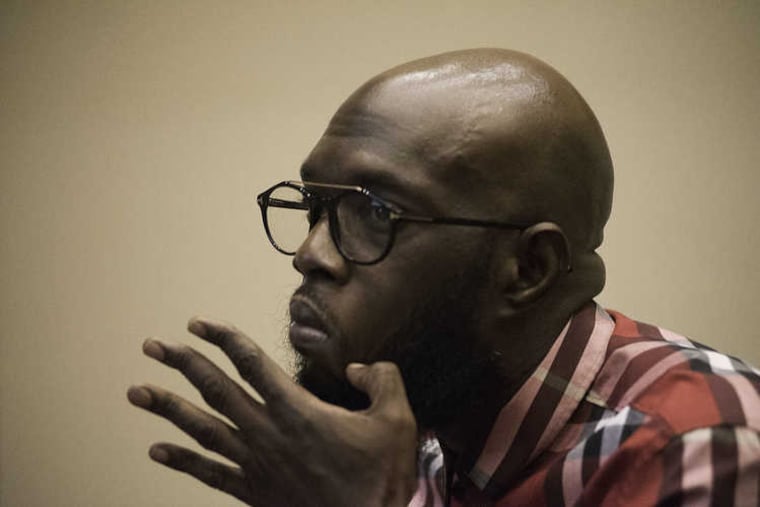Freeway’s debut album is turning 20, and I still can’t stop listening to one of Philly’s most iconic hip-hop anthems
"Philadelphia Freeway" — which helped define the city's hip-hop scene — was released two decades ago. It introduced the world to the classic "What We Do."

There’s a reason why we faithfully recite “Intro” during Eagles championships, or why we shake our hips to “Just Wanna Rock” at the Wells Fargo Center. They’re both Philly anthems.
It was Tyesha Wilson that reminded us just how essential Philly anthems are when she went viral in 2018 for immaculately rapping “What We Do” at a 76ers-Heat game. Body rocking and arms swaying in an Eagles hoodie, the North Philadelphia native recited the classic word for word with pride, daring anyone to come for her beloved city and favorite sports team. It was an enduring social media moment for the city.
That should be no surprise, since the song is from an album that helped define Philly in the hip-hop scene. In 2003, Freeway released his debut studio album, Philadelphia Freeway, unleashing the lead single “What We Do” in late 2002.
The North Philly-born rapper had recently signed to Rocafella Records, a label formed by hip-hop moguls Jay-Z, Dame Dash, and Kareem Biggs that later became Roc Nation. The Roc was a pioneering label in the 2000s, with a roster that included a then-unknown rapper-producer named Kanye West and State Property, a rap group consisting of Beanie Sigel, Freeway, Peedi Crakk (Peedi Peedi), Omillio Sparks, Oschino Vasquez, and the Young Gunz (Chris & Neef), all of whom call Philly home. They were the Wu-Tang of Philly: all stars within their own right with a collective sound.
By the time the State Property film and soundtrack premiered in 2002, I was already obsessed with everything Rocafella while developing a deep affinity for Philly. My bus rides to and from school were laced with music from Freeway, Beanie Sigel, Eve, The Roots, Jill Scott, and Musiq Soulchild.
My evenings were spent rooting for Allen Iverson and the 76ers on their journey to the 2001 NBA Finals, from the living room of a devout Knicks household. When it came time to apply for college, Drexel was at the top of my list. It would be decades later, however, that I would find myself living in Philadelphia, applying for grad school, yelling “Go Birds!” to the dismay of my Giants dad, and still bumping Philadelphia Freeway like it had just been released.
You just had to be outside when “What We Do” dropped. From the first few seconds, it commands an audience. There are certain songs that feel like both warning and celebration, and this is one of them. It’s vicious and victorious at once: a feel-good anthem that gets you fired up. Freeway holds his own lyrically among Jay-Z and Beanie Sigel over Just Blaze’s ferocious production, delivering one of hip-hop’s most memorable verses.
Freeway took us on an unforgettable ride through the city on his debut studio album, staying true to both his name and his lane on Philadelphia Freeway. He brought the streets of Philly to the world and back again, sitting comfortably alongside star-studded guests such as Jay-Z, Snoop Dogg, Mariah Carey, and his own State Property family. It’s a solid journey from start to finish and helped solidify the City of Brotherly Love’s rightful place in hip-hop. “Flipside” is just as much an anthem as “What We Do,” and if “Don’t Cross The Line” could start a war, I’m pretty sure “Alright” could end one. With production from Just Blaze, Ye, and Blink!, the album is gritty and soulful, fresh and historical, hard-hitting and trendsetting: much like Philadelphia itself.
“The album is gritty and soulful, fresh and historical, hard-hitting and trendsetting: much like Philadelphia itself.”
Over the years, there have been many notable rap artists who kept Philly on the hip-hop map. Legendary acts Schoolly D, Will Smith, and The Roots paved the way for hometown heroes such as Meek Mill, Lil Uzi Vert, and PnB Rock to open doors for viral talents like Tierra Whack, 2Rare, and Armani White. Still, what Freeway and State Property did for Philly music — and the culture, in general — will always go down as a definitive era in rap history, inspiring an entirely new level of respect for Philly’s ever-present hip-hop scene.
As hip-hop celebrates its 50th anniversary, it’s only right we give Freeway his flowers at The Fillmore on Saturday for the 20-year anniversary of Philadelphia Freeway, a classic and culture-shifting album that lets you know where he’s from, who he is, and ultimately, what type of time he’s on. That time just happens to be timeless.
Ronnia Cherry is a curator for Pandora Music and host for Sofar Sounds Philadelphia.